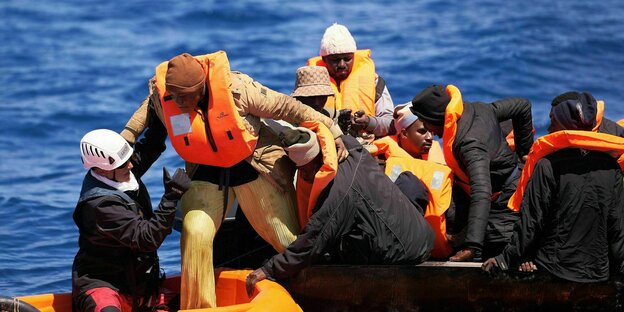The criminalization of migrants and their helpers in the EU is increasing. Driving a boat can result in decades in prison.

It could be a criminal offense: sailors help migrants get off an overcrowded boat off the coast of Lampedusa Photo: León Salner/Picture Alliance
Sea rescue, accommodation or simply food distribution: in 2023, at least 117 people in the EU will be brought to justice for having shown solidarity with migrants. This was the result of an evaluation carried out by the NGO Picum (pdf). Therefore, most of them were charged with complicity in illegal entry or residence or smuggling of migrants.
According to research, the numbers have been increasing for years, but they are “just the tip of the iceberg,” said Picum director Michele LeVoy. The number of unreported cases is high and there are no official statistics. LeVoy criticized that the EU does not want to continue exempting humanitarian acts from possible criminalization in the fight against human trafficking. According to the study, the majority of recorded cases occurred in Italy (74), followed by Greece (31). In Latvia, two citizens were charged with complicity in illegal entry because they gave food and water to migrants stranded on the border with Belarus.
“The criminalization of solidarity with migrants is closely linked to the criminalization of migration itself,” LeVoy said. It is “a series of restrictive immigration policies that make border crossings unsafe and create a hostile environment for those considered to have entered the country irregularly.”
Since 2020, a law in Greece has recently regulated the crime of complicity in illegal entry. Since then, virtually any form of support (medical care, transportation, maritime rescue within territorial waters or food distribution) can be persecuted if people have not yet been officially registered, that is, if they have just arrived. Although assistance is theoretically permitted, helpers must first coordinate with authorities, such as the coast guard. They may refuse support. If the helpers still act, they face criminal prosecution.
Doctors Without Borders (MSF) employees in Greece inform the tazthat in emergency situations they cannot even care for pregnant women or people with broken bones who arrive on the shores of the Aegean islands without having to fear legal consequences. If aid operations were coordinated with other NGOs, this could be interpreted as “organized crime.”
In Greece, aiding and abetting illegal entry is punishable by ten years in prison, per person. So far there have been no legal proceedings against the Europeans, “but we are walking a very thin line,” says an MSF coordinator. There are even more cases against refugees accused of smuggling because they were driving boats. In Greece, police pressure new arrivals to accuse other passengers. “They are trying to get one per boat,” said a spokeswoman for the NGO Border Violence Monitoring Network in Greece.
According to a count by the NGO Borderline Europe, already in 2022 more than 2,000 immigrants were in Greek prisons after these types of procedures. According to Borderline Europe, at least 1,374 people were arrested for smuggling in 2022, and a total of 550 were arrested in Italy in 2022 and 2023. An analysis of 81 procedures in Greece between 2022 and 2023 showed that negotiations lasted an average of 37 minutes . The end result was an average prison sentence of 46 years.
Meanwhile, last Saturday in Valletta, Abdalla Bari, Amarah Kroma and Abdul Kader received the University of Malta Human Rights Defenders Award from former President of Malta Marie-Louise Coleiro Preca. The three have been charged with terrorism in Malta since December 2023. Prosecutors accuse them of hijacking the oil tanker “El Hiblu 1” after they and 100 other refugees were rescued from danger at sea by the crew in 2019. They face 30 years in prison, although, according to witness statements, the minors at that time had mediated between the captain and the angry immigrants. Coleiro Preca described the trial against the young people as a “farce.”
